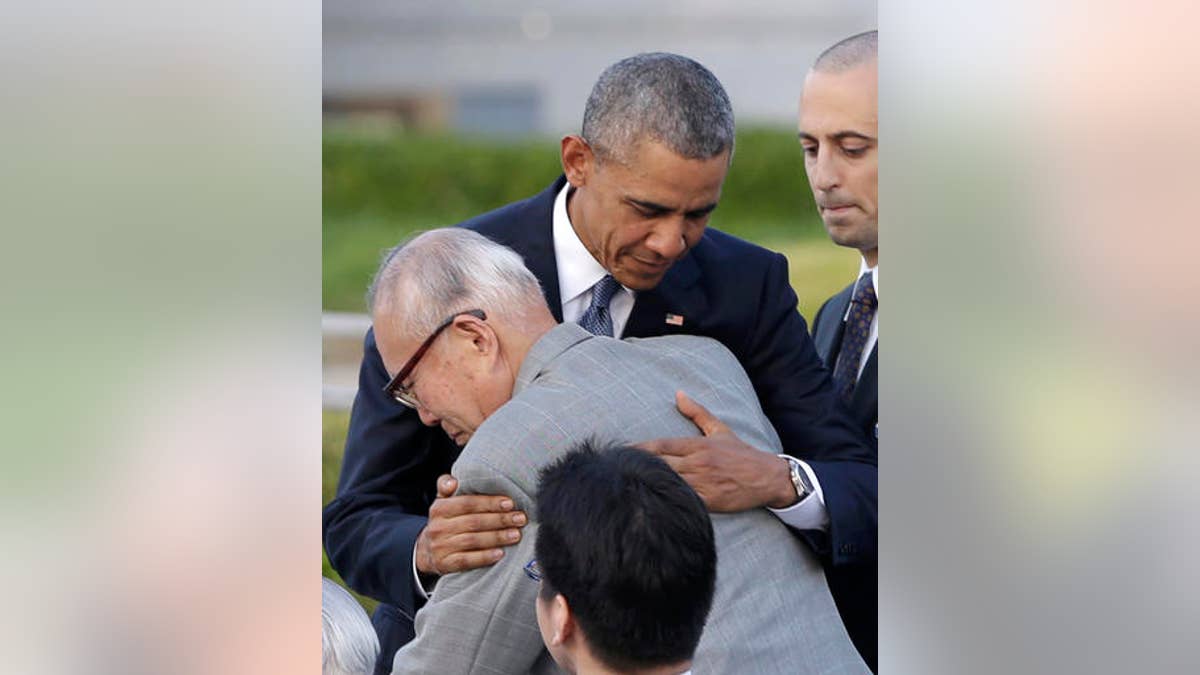
U.S. President Barack Obama hugs Shigeaki Mori, an atomic bomb survivor; creator of the memorial for American WWII POWs killed at Hiroshima, during a ceremony at Hiroshima Peace Memorial Park in Hiroshima, western, Japan, Friday, May 27, 2016. Obama on Friday became the first sitting U.S. president to visit the site of the world's first atomic bomb attack, bringing global attention both to survivors and to his unfulfilled vision of a world without nuclear weapons. (AP Photo/Carolyn Kaster) (Copyright 2016 The Associated Press. All rights reserved. This material may not be published, broadcast, rewritten or redistribu)
I applaud President Obama’s decision to visit Hiroshima, Japan, the site of the world’s first atomic blast, which occurred 71 years ago in the midst of the Second World War.
We as Americans can debate the merits of the messaging that accompanied his visit – was it appropriate? Was it implicitly apologetic? Was it timely? (It is Memorial Day weekend, after all) – from now until eternity, but his decision to undertake this trip is categorically a smart one and deserves a solid defense.
The decision to visit Hiroshima serves American national security interests in the 21st century on two levels: tactical and strategic. Yes, it concurrently bolsters President Obama’s carefully constructed narrative about himself and his vision of the United States’ role in the world, as well; but do not for a moment allow this political expediency to distract from the reality that this visit serves our great nation’s core interests.
At the tactical level, this trip is a reward for Japanese Prime Minister Shinzo Abe, and recognizes his recent commitments to strengthening the bilateral military-to-military relationship between Japan and the United States. As China has become emboldened with each successive and (virtually) uncontested foray into the South China Sea, it is proportionally imperative that the United States shore up its security alliances in East Asia. This is a fairly straightforward calculus that critics on both sides of the aisle should be able to get behind.
At the strategic level, President’s Obama’s decision to visit Hiroshima reaffirms his commitment to the prevention of nuclear proliferation worldwide (those who have been paying attention will recognize non-proliferation as the conceptual cornerstone of his entire foreign policy platform).
His ambition to denuclearize the international community is something he has broadcast loudly, and from day one of his presidential campaign, and should therefore not come as a shock to anyone.
By traveling to the heart of the only country on earth where human beings have ever been killed by atomic weapons, the president has highlighted for the world in very clear terms the collective peril we face in a nuclearized 21st century.
By receiving victims of Hiroshima who can’t help but display their psychological scars as visibly as their physical ones, he is reminding us, in this terrorism-addled age, that there are indeed greater existential horrors to be reckoned with.
Today, that existential threat is embodied most ominously by Kim Jong Un’s North Korea (but there are others, too). He is highlighting the very real threat North Korea’s nuclear provocations pose to the region, and in so doing is trying to rally Japan, China, Vietnam, and South Korea to hedge against it. While it’s true that most of these same countries may be temporarily incensed by this visit, the more important strategic point here is that these countries will need to unite if they hope to deter North Korea in a meaningful way.
Is there an implicit ‘apologist’ undertone to this trip to Hiroshima? Perhaps and perhaps not; I’ll leave that to other analysts to determine. Does this visit fit rather neatly into a narrative about President Obama as a would-be peacenik and lover of reconciliation regardless of its costs (here’s looking at you Iran, Cuba, and Venezuela)?
Perhaps.
But the larger, more important point remains nonetheless. In an era of rapidly evolving security threats that are often asymmetrical and unpredictable in nature, nuclear weapons are an existential threat we can count on. Eradicating terrorist organizations and neutering radical Islam means very little if we cannot first guarantee we’ll all be here tomorrow. This is President Obama’s battle cry, and it’s resounded louder than ever before on this Memorial Day weekend 2016.
Gillian Turner is a Fox News contributor and former National Security Council staffer under George W. Bush and Barack Obama.
